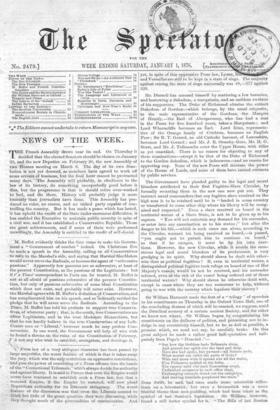Mr. Disraeli has amused himself by scattering a few baronies,
and bestowing a dukedom, a marquisate, and an earldom on three of his supporters. The Duke of Richmond obtains the extinct Dukedom of Gordon—which belongs, by the usual etiquette, to the male representative of the Gordous, the Marquis of Huntly,—the Earl of Abergavenny, who has had a seat in the Peers for five hundred years, takes a Marquisate ; and Lord Wharncliffe becomes an Earl. Lord Erne, representa- tive of the Orange family of Crichton, becomes an English Peer ; Sir R. T. Gerard, an old Catholic baronet, of Lancashire, becomes Lord Gerard ; and Mr. J. R. Ormsby-Gore, Mr. H. G. Sturt, and Mr. J. Tollemache enter the Upper House, with titles as yet unsettled. There is no reason for objecting to any of these nominations—except it be that of the Duke of Richmond to the Gordon dukedom, which is indecorous—and no reason for approving any. None of the new Peers will increase the power of the House of Lords, and none of them have earned coronets by public services.










































 Previous page
Previous page